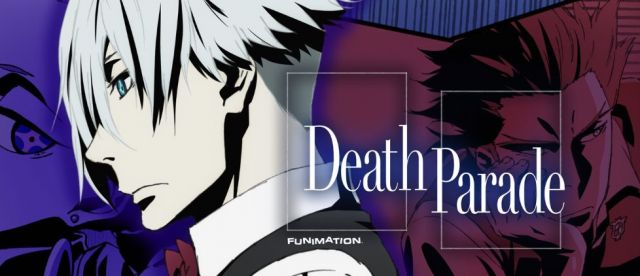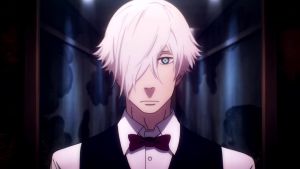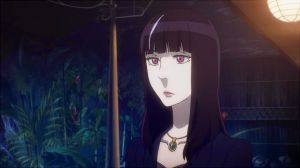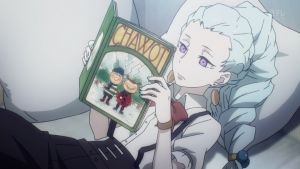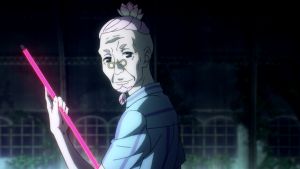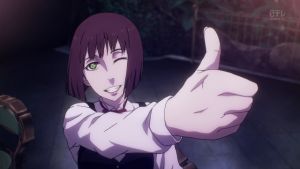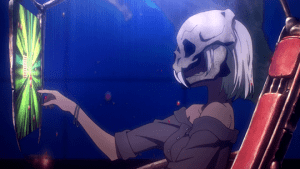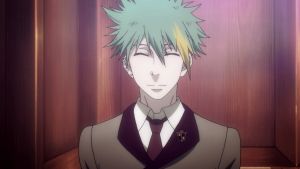The question of “what happens when we die?” has been asked and does not really have a true answer because the only way to find out, is to die. Death Parade tries to answer that question in its own unique way. Produced by Madhouse, Death Parade was said to be one of the best animes to come along so far in 2015 and I tend to agree! So what made Death Parade so good? We’re going to explore that and find out!
Let’s jam!
The Story
Death Parade takes place inside of a bar called Quindecim. Here, people known as arbiters, judge the recently deceased by bringing out their worst emotions to judge whether or not they are truly worthy of being sent to heaven or hell, however, Death Parade puts a spin on the whole heaven and hell thing by saying there is no such thing as either or.
Instead, if you are judged to be good, you are sent for reincarnation. If you’re not-so-good, then your soul gets sent to the void where it will remain there for all eternity with the feeling that you are falling a great distance in perpetual darkness. Sounds lovely.. sign me up for that!
On the surface, it would seem as if Death Parade is an episodic series. A couple passes away, gets sent to Quindecim where they cannot leave until they play a game that you would typically play in a bar. Games such as darts, billiards, air hockey, even old maid are played in order to draw out the person’s memories. Nobody who comes to Quindecim ever remembers how they get there and it’s up to them to rediscover their memories of how they died by playing these games. Decim, our bartender and main protagonist, will convince these people that their lives are on the line in these games in order to instill fear and bring out their emtions. Then, once their true natures are revealed, Decim explains everything, judges them, and sends them on their appropriate ways.
So right off the bat, the show misleads you into thinking that each week we will see a new couple’s story and learn about their lives as they await judgment, but that’s not the case… well… not entirely. We don’t get a new couple every single week, but there are plenty of visitors and games to be played in this series, but they shift from the forefront to the background as the show will start focusing more on the arbiters themselves, especially Decim and his assistant Kurokami no Onna, who doesn’t remember anything at all and mainly becomes an assistant.
They say that arbiters are merely dolls. They don’t possess human qualities or emtions. Their only jobs are to judge, but Kurokami changes that inside of Decim. She makes him realize that there is more to people than what Decim is drawing out. Because as such, Decim is beginning to think more and more like a human which is something that is unheard of and, apparently, frowned upon within Quindecim. Some even believe that Decim is defective, however, Nona, who is a lead arbiter and supervisor, believes that this change could be good for Quindecim all together.
The show’s underlying theme throughout is all about morality and what it truly means to be human. The people are not just as black and white as the arbiters make them out to be so therefore, their judgments have to evolve in order to truly understand people as a whole. Especially when the judgments go wrong and sometimes people are sent to the void when they should have been reincarnated like in the very first episode of the series. Every case where a couple visits the bar has its purpose. Not only do you get to peer into the lives of those who come to Quindecim, but you also see the changes in Decim himself each and every time a new couple arrives. Each story told is interesting on its own, but at the same time, each side story props up and helps propel the main story along, fortifying it with more details and backstory about the arbiters and their jobs. It puts a really interesting spin on the overall series and my only complaint is that the ending felt kind of rushed, but when you only have twelve episodes to work with, you could probably expect something like that to happen.
The story will keep you hooked from beginning to end. There are some shocking moments in there… not in the way where it’s like a major reveal or plot point, but some of the actions of the arbiters kind of makes you wonder about them… escpecially Ginti… as I believe he had one of those type of “how could you” moments.
The Characters
While there are a lot of characters in Death Parade, I will focus on the main and supporting characters. The characters from each of the stories only appear in one or two episodes each so it’s better just to watch the anime and see them for yourselves and since some of the stories are episodic, it would spoil a lot of the anime by going into detail about them.
Decim
Your main character for the series. He is an arbiter that was put in charge of Quindecim. As I stated in the story, he starts to become more and more like a human even though he is nothing more than a doll. It’s all thanks to Kurokami and her observations of how Decim judges others who visit the bar. Decim has a very open mind, but it’s comparable to that of a child in the sense that he seems like he doesn’t know anything and is learning about stuff as he goes along, much like a child learns about the world as they grow older. Decim also gets surprised by many of the things Kurokami tells him about how each human is different and sometimes they are capable of hiding their true feelings into order to protect the ones that they love. Decim never even considered that and it’s something you can’t blame him for because as a doll, he’s pretty much programmed not to think that way. He has a child’s innocence about him to where you can fully understand why and when he makes mistakes in his job. He’s a pretty interesting character that’s both straight-forward and complex at the same time… something that is pretty hard to pull off, but they managed to do this wonderfully here!
Kurokami no Oona
She wakes up in a train station one day next to Nona who brings her to Quindecim and appoints her as Decim’s assistant. She doesn’t know anything about Quindecim or why she was even there, but she catches on to what they do rather quickly. The one thing that really sets her apart is her eyes. Every arbiter in Quindecim has a plus shaped iris which spins when memories of the deceased they are about to judge are transmitted to them, but Oona has regular, ordinary eyes which means that she is human. That much you can figure out, but why is a human an assistant? They actually go into that in great detail in the latter half of the series and her tale is pretty interesting, although a bit petty. Once you see the way she died, you may not feel any pity for her, but as a character she does grow and realizes the error of her ways. The way Decim tries to draw out her dark side, though, kind of makes you hate him a little for trying it that way, but you have to hand it to Kurokami for standing her ground against his method. She seemed like a throwaway character at first, but it was a slow burn that paid off in the end as she became someone you really got attached to.
Nona
The lead arbiter and supervisor of all the other arbiters. She’s depcited as a child, but she’s far more cunning and mature than her looks give her credit for. The way they portray her, you can tell it’s painfully obvious that she set up Oona to work with Decim on purpose in order to change the way judging is made. She, too, firmly believes that there should be human qualities in the arbtiers in order to make judging them more accurate, but human qualities in dolls isn’t a very popular subject and so she has to set everything up innocently, covertly, and feign ignorance and curiosity when she, obviously knows exactly what she’s doing.
Oculus
Oculus is the head of the organizataion that judges souls. He is the closest to God out of all of them and he very much opposes arbiters having human qualities. He is often seen playing pool with Nona and comes off as a genuinely nice character, until he learns of Decim. He’s very passive aggressive and even goes as far as to reading people’s minds in order to obtain information about everything Nona is doing. Here’s a character that you kind of love to hate because on the outside he seems innocent, but he is pretty much one of those “old people set in their ways” type of characters who doesn’t like change or the fact that people are going behind his back to make change happen. Nothing really gets resolved with him in this series making me think they might end up going for a second season, but if not, then he’s probably one of the most open-ended characters I’ve seen in a while.
Ginti
For a show that boasts arbiters have no human emotions, Ginti breaks that notion in the fact that he despises humans, which is a human quality. Ginti is rough around the edges and more like a male tsundere more than anything. Even though he’s brash and it’s a pain for him, he takes in Mayu, a girl who died and cannot be judged because she’s too much of a brainless ditz to get a good read on her. Mayu, essentially, becomes Ginti’s assistant much in the way that Oona is Decim’s assistant, but we don’t really get to see any interaction between the two of them until the end of the series. It was kind of like a “oh right, they’re still there” moment when you see them. Again, with it being only twelve episodes, they didn’t really have the time to expand on them and show any kind of interaction, which is kind of a letdown.
Quin & Castra
I’m lumping these together because they get so little screen time, yet they serve the same function. Quin is the former bartender of Quindecim… she passes the job off to Decim. Now Quin and Castra work in the information bureau where they decode the memories of those who just recently died and pass them along to the arbiters when the newly deceased arrive to be judged.
Clavis
Another throwaway character. He’s the elevator attendant. Despite being simplistic, he’s a character you tend to love. Just his personality makes you grow attached to him. It’s hard to describe.. perhaps it’s the care-free attitude or the attitude where it’s like ‘whatever, I just push elevator buttons” that he give off… there’s just something about the character that maximizes his minimalistic role.
Other than the aforementioned, we have all the characters from the individual stories to round out a rather large cast. Every character gets developed in some way shape or form.. whether it’s a full backstory or just enough information to define their role, give them a personality, and make them a small piece inside of the big puzzle. Every character serves their purpose and none of them seem like cannon fodder with the exception of Mayu, but, then again, that could just be by design. Everything seems very well-balanced, a hard feat to accomplish given so little room to work with!
Art, Animation, and Sound
The Quindecim bar is beautiful. It looks more like a lounge than a bar. It’s definitely not Harry’s Bar from Witch Hunter Robin, but it’s still very well-designed and a place I could see myself hanging out in… just.. .not when I’m dead. The backgrounds are okay. There’s nothing that really jumps out at me and makes me say “WOW”, but what is there looks decent enough, but when the majority of your series takes place inside of a bar, then, yeah… backgrounds really aren’t going to be at the forefront of the studio’s budget. In fact, a lot of the scenery is forgettable since we do spend the majority of our time in Quindecim.
The characters themselves are drawn uniquely. While they have that anime look, they appear more human-like than anime-like. The type of eyes the arbiters have is unique and it really draws your attention to them. The Japanese love their eyes in anime, afterall. Some of the depictions of the characters, though… well… just watch episode one to see what I mean. Thankfully, they didn’t repeat the really goofy facial expressions and animations throughout the series like they did with Machiko and Takashi, the first dead couple that we meet, because that was just… weird. That’s probably the best way I can describe it. It’s one of those moments that’s supposed to be serious but you find yourself laughing uncontrollably.
The animation was pretty solid. You could tell where they used CG, like when a couple chooses a game and the game appears within the bar, but outside of that, everything seemed to blend in. Everything was fluid and nothing seemed out of place, with the exception, of again, the first episode where Decim was clapping after Machiko and Takashi finished their game of darts… I mean, who claps with their fingers looking all weird like that?
If I had to pick a favorite part about the animation, it would be any of the scenes of Oculus and Nona playing pool. The billiard balls were the planets in the solar system with the sun being the 8-ball. The fact that they’re playing pool with the universe is a pretty nice touch and a hidden piece of symbolism that ties in very well with the overall theme of the series.
There were a few pieces of music that really stood out throughout the series and it was enough for me to pick up the soundtrack. After listening through the entire collection, it was hit or miss. The opening track set the mood for the album as it was very mellow and beautiful. Then the middle tracks seemed to just be filler with a good song here or there. The final two tracks hit it out of the park, with the final track (“moonlit night”) being the one played during the ice skating scene in the final episode. Those last two were simply just brilliant and I could listen to them over and over again.
Overall Thoughts
I think this is a must-watch series. FUNimation currently holds the license to the show and they are streaming the episodes in English dub, but they are behind their paid premium service. I did happen to catch one of the episodes on YouTube and even though it was pitched differently to avoid copyright, the English dub was pretty damn good. I was actually surprised at how well it was done. I might have to pick this one up on Blu-Ray and watch through the whole thing in English to see the rest of the cast as the first episode had me hooked and I usually never say that about an English dub with a few exceptions here or there.
Everything from the stories to the character development was pulled off very well with the time they were given. Even if it were filler, I would have loved some more backstory on some of the characters and felt this show could have easily ran with 24 episodes and still have it not end up boring. Despite some of the open-endedness with some of the characters, everything here will make you want the next episode more and more. It’s one of those series that you find yourself going “DAMMIT” at the credits because the episode ended when you were just getting really into it.
Speaking of credits, I have to point out the opening and ending themes as they were among some of the best of the year. “Flyers” by BRADIO opened the show and it’s got a vibe that is completely opposite of what the show is about. Judging the show on the opening alone would make Death Parade seem more like a comedy than a drama. It’s full of energy that makes you smile and the song itself is like a hi-def blast from the ‘80s. The ending theme is “Last Theater” by NoisyCell and it takes the more serious and depressing route and really sums up the overall tone of the series. Also, the theme song is sung completely in English, too, so you don’t have to go online and find a translation. The singer sings some of the best English I’ve heard since Coldrain and Coldrain knows how to sing some good English. I may have to look up NoisyCell’s discography and see if there’s anything else they have that I might like.
Death Parade is now available in Australia from Madman Entertainment! International fans can now purchase the series on DVD & Blu-Ray at the following links:
DVD: https://www.madman.com.au/catalogue/view/32022/death-parade-complete-series
Blu-Ray: https://www.madman.com.au/catalogue/view/38314/death-parade-complete-series-bluray
If you wish to comment on this review, or give me a recommendation for a show to review, send an E-Mail to joshpiedra@theouterhaven.net. If you feel so inclined to do so, you can follow me on Twitter @TheAnimePulse
Until next time,
Ja ne!
An international copy of Death Parade was provided for review by Madman Entertainment.
Everybody! Put Your Hands Up!
A nicely fleshed out drama about the lives of those who passed on and those who judge them.
-
Dancing Through the Skies!


